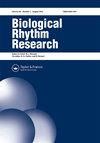时钟基因与癌症
IF 0.9
4区 生物学
Q3 BIOLOGY
引用次数: 1
摘要
遵循24小时周期的精神、身体和行为变化被定义为昼夜节律,这种对光和暗的反应影响着大多数生物,包括动物、植物和微生物。生物钟由特定的分子(时钟基因)组成,它们与全身的细胞相互作用,是生物体用来调节昼夜节律的计时装置。在人类胃肠道中已经观察到昼夜节律。为此,基础胃酸的产生、上皮细胞的增殖、胃肠运动和食欲调节随着一天的时间而变化。生物钟基因的异常表达可以改变正常的昼夜节律,从而导致包括癌症在内的各种疾病。本研究的目的是讨论和总结时钟基因的表达与胃癌发生发展的关系,并探讨将这些基因作为胃癌患者预后的生物标志物的可能性。RORE:维甲酸相关孤儿受体反应元件;CLOCK:昼夜运动输出周期失效;BMAL1:脑和肌肉arnt样蛋白1;artl:芳烃受体核易位样;每:周期;哭:隐花色素;mTOR:哺乳动物雷帕霉素靶蛋白;VNTR:可变数串联重复;cAMP/PKA:环磷酸腺苷/蛋白激酶A通路本文章由计算机程序翻译,如有差异,请以英文原文为准。
Clock genes and gastric cancer
ABSTRACT The mental, physical and behavioural changes that follow a 24-hour cycle are defined as circadian rhythms, and this response to light and dark affects most living things, including animals, plants and microbes. Biological clocks are composed of specific molecules (clock genes) that interact with cells throughout the body and are the timing devices that organisms use to regulate circadian rhythms. Circadian rhythms have been observed in the human gastrointestinal tract. To this end, basal gastric acid production, epithelial cell proliferation, gastrointestinal motility and appetite regulation vary with the time of day. The abnormal expression of clock genes can alter normal circadian rhythms and subsequently cause a variety of illnesses, including cancers. The aim of this study was to discuss and summarize the relationship between the expression of clock genes and the development and progression of gastric cancer and to explore the possibility of using these genes as biomarkers in gastric cancer prognosis in patients. Abbreviations: RORE: retinoic acid-related orphan receptor response element; CLOCK: circadian locomotor output cycles kaput; BMAL1: brain and muscle ARNT-like protein 1; ARNTL: aryl hydrocarbon receptor nuclear translocator-like; PER: period; CRY: cryptochrome; mTOR: mammalian target of rapamycin; VNTR: variable number tandem repeat; cAMP/PKA: cyclic adenosine monophosphate/protein kinase A pathway
求助全文
通过发布文献求助,成功后即可免费获取论文全文。
去求助
来源期刊

Biological Rhythm Research
生物-生理学
CiteScore
3.00
自引率
9.10%
发文量
34
审稿时长
6-12 weeks
期刊介绍:
The principal aim of Biological Rhythm Research is to cover any aspect of research into the broad topic of biological rhythms. The area covered can range from studies at the genetic or molecular level to those of behavioural or clinical topics. It can also include ultradian, circadian, infradian or annual rhythms. In this way, the Editorial Board tries to stimulate interdisciplinary rhythm research. Such an aim reflects not only the similarity of the methods used in different fields of chronobiology, but also the fact that many influences that exert controlling or masking effects are common. Amongst the controlling factors, attention is paid to the effects of climate change on living organisms. So, papers dealing with biometeorological aspects can also be submitted.
The Journal publishes original scientific research papers, review papers, short notes on research in progress, book reviews and summaries of activities, symposia and congresses of national and international organizations dealing with rhythmic phenomena.
 求助内容:
求助内容: 应助结果提醒方式:
应助结果提醒方式:


